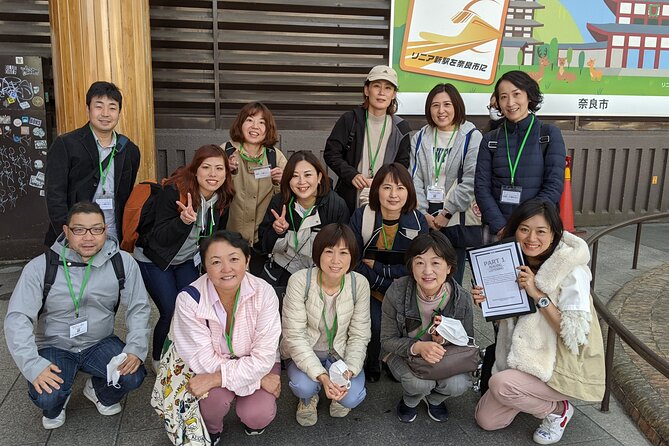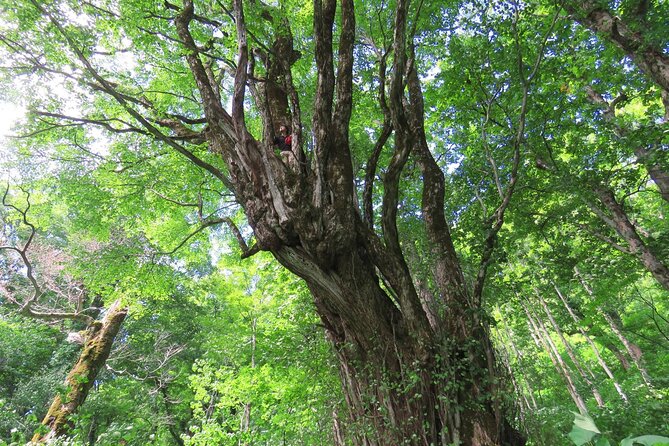Did you know that early morning activities have been found to improve productivity and overall well-being?
If you’re looking for a unique way to start your day, then the special activity of Tea Tasting and Japanese Zen might just be what you need.
This article will take you on a journey through the world of tea and the tranquility of Japanese Zen culture.
From learning about the art of tea making to experiencing the serenity of morning meditation, this activity offers a peaceful and rejuvenating experience.
So, if you’re curious to discover how tea and Zen can enhance your mornings, stay tuned for an insightful exploration of this special activity.
Quick Takeaways
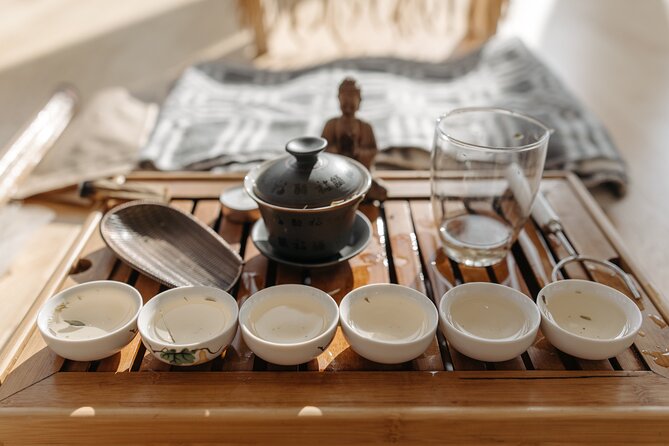
- Early morning tea tasting can provide numerous health benefits, including boosting the immune system and promoting overall well-being.
- The Japanese Tea Ceremony is a revered art form that emphasizes mindfulness, attention to detail, and traditional etiquette.
- Zen gardens offer a tranquil and peaceful environment for contemplation and reflection, with minimalism and symbolism playing key roles.
- Morning meditation can reduce stress, enhance focus and concentration, and promote relaxation through various techniques such as deep breathing and mantra repetition.
Benefits of Early Morning Tea Tasting
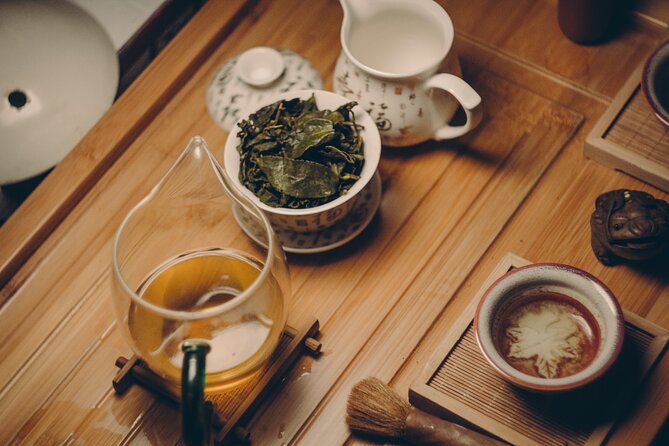
Early morning tea tasting offers a multitude of benefits, making it an ideal activity for those seeking a refreshing and enlightening experience.
Starting the day with a cup of tea can provide numerous advantages for one’s morning routine. Firstly, tea is known to contain antioxidants, which can help boost the immune system and promote overall health. Plus, the ritual of preparing and sipping tea can serve as a mindful practice, promoting relaxation and mental clarity.
To start a morning tea practice, one can begin by selecting a variety of teas that suit their taste preferences and health goals. It’s also recommended to establish a consistent tea-drinking routine and create a peaceful environment to fully enjoy the experience.
Exploring the Art of Japanese Tea Ceremony
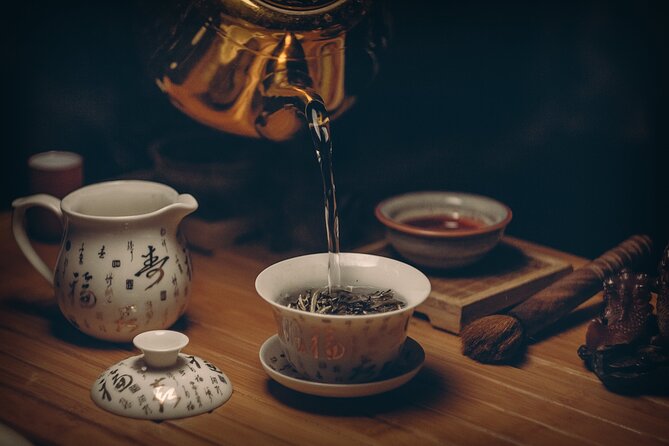
The Japanese Tea Ceremony is a traditional and highly respected art form that involves the meticulous preparation and presentation of matcha tea. Japanese tea ceremonies are deeply rooted in mindfulness practices, emphasizing the importance of being present in the moment and finding inner peace. These ceremonies follow traditional tea ceremony etiquette and rituals, which add to the elegance and grace of the experience. To convey a deeper understanding of the art, here is a table showcasing some key elements of a traditional Japanese tea ceremony:
| Elements | Meaning |
|---|---|
| Chawan | Bowl used for serving tea |
| Chasen | Bamboo whisk used to mix the tea |
| Chashaku | Bamboo scoop used to measure the tea |
| Furo | Portable brazier used to heat water |
Discovering the Tranquility of Zen Gardens
Zen gardens offer a serene and peaceful environment for contemplation and reflection. These meticulously designed gardens, rooted in Japanese garden design principles, provide a tranquil escape from the chaos of everyday life.
Here are three key elements that contribute to the tranquility of Zen gardens:
- Minimalism: Zen gardens showcase simplicity and minimalism, with carefully placed rocks, raked gravel or sand, and sparse vegetation. This minimalist approach creates a sense of calm and encourages focused meditation.
- Symbolism: Each element in a Zen garden holds symbolic meaning. Rocks represent mountains, while raked patterns in the gravel symbolize water or waves. These symbolic elements invite contemplation and deeper reflection.
- Balance and Harmony: Zen gardens strive for balance and harmony. The placement of rocks, plants, and other elements is carefully considered to create a sense of visual harmony. This balance promotes a feeling of tranquility and encourages a peaceful state of mind.
Taking in the Serenity of Morning Meditation

As one continues to explore the tranquility of Zen gardens, an opportunity arises to take in the serenity of morning meditation. Morning meditation offers numerous benefits for both the mind and body. It helps to reduce stress, increase focus and concentration, improve emotional well-being, and enhance overall mental clarity. Practicing mindfulness techniques during morning meditation can further enhance the experience. Some popular techniques include deep breathing exercises, body scan meditation, and mantra repetition. Deep breathing exercises involve taking slow, deep breaths to promote relaxation and calmness. Body scan meditation involves systematically scanning the body for any tension or discomfort and releasing it through focused attention. Mantra repetition involves silently repeating a word or phrase to quiet the mind and cultivate inner peace. By incorporating these techniques into morning meditation, one can fully enjoy the serenity of the practice.
| Benefits of Morning Meditation | Techniques for Practicing Mindfulness |
|---|---|
| Reduces stress | Deep breathing exercises |
| Increases focus and concentration | Body scan meditation |
| Improves emotional well-being | Mantra repetition |
| Enhances mental clarity |
Enhancing Your Well-Being With Mindful Tea Tasting
Enhance your well-being through the practice of mindful tea tasting. Mindful tea rituals offer a unique way to promote relaxation and cultivate a sense of calm in our fast-paced lives. Here are three ways in which mindful tea tasting can enhance your well-being:
-
Increased mindfulness:
Mindful tea tasting encourages you to be fully present and aware of each moment. It invites you to engage all your senses in the experience, from the aroma of the tea to the taste on your tongue. This heightened awareness can help reduce stress and anxiety, allowing you to fully savor the present moment. -
Connection with nature:
Tea is often derived from plants and herbs, connecting us to the natural world. Mindful tea tasting provides an opportunity to appreciate the beauty and complexity of nature, fostering a sense of gratitude and grounding. -
Ritual and self-care:
Engaging in a mindful tea tasting ritual can become a form of self-care. Taking the time to prepare and savor a cup of tea allows you to slow down, prioritize self-care, and create a peaceful space for yourself.
Frequently Asked Questions

What Is the Duration of the Tea Tasting and Japanese Zen Activity?
The duration of the tea tasting and Japanese Zen activity is not specified. However, participants can expect to experience the benefits of Japanese Zen, such as relaxation and mindfulness, during the activity.
Are Children Allowed to Participate in the Activity?
Young kids can join the activity without any age restrictions. They are welcome to participate in the Special Activity for EARLY Birds!Tea Tasting and Japanese Zen.
Is There a Minimum Age Requirement for the Tea Tasting and Japanese Zen Activity?
There is no minimum age requirement for the tea tasting and Japanese Zen activity. Children are allowed to participate in this special activity for early birds.
Will There Be Any Breaks During the Activity?
Yes, there will be breaks during the activity for relaxation. Participants can take some time to unwind and rejuvenate before continuing with the tea tasting and Japanese Zen experience.
Are There Any Specific Clothing Requirements for the Tea Tasting and Japanese Zen Activity?
Comfortable and relaxed attire is recommended for the tea tasting and Japanese Zen activity. The duration is approximately 2 hours with short breaks for relaxation and refreshments. Children of all ages are welcome to participate.
The Sum Up
To sum it up, the Tea Tasting and Japanese Zen activity offers early birds a unique and meaningful experience.
By exploring the art of tea making and immersing oneself in the tranquility of Japanese Zen culture, participants can awaken their senses and find inner calm.
With the opportunity to savor various teas and practice mindfulness through morning meditation, this activity is a perfect way to start the day and enhance overall well-being.
Join us for this special and rejuvenating journey.


